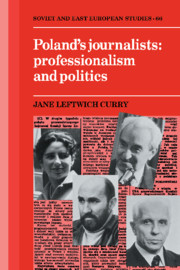Book contents
- Frontmatter
- Contents
- Acknowledgments
- 1 Journalists as professionals in theory and reality
- 2 The postwar roots of the profession
- 3 Living and learning journalism
- 4 Professional associations and professional politics
- 5 Journalists as political actors
- 6 Solidarity and beyond: the critical test of professionals and professionality
- Appendix: Research methodology: unwritten answers
- Notes
- Select bibliography
- Index
- Soviet and East European Studies
5 - Journalists as political actors
Published online by Cambridge University Press: 30 September 2009
- Frontmatter
- Contents
- Acknowledgments
- 1 Journalists as professionals in theory and reality
- 2 The postwar roots of the profession
- 3 Living and learning journalism
- 4 Professional associations and professional politics
- 5 Journalists as political actors
- 6 Solidarity and beyond: the critical test of professionals and professionality
- Appendix: Research methodology: unwritten answers
- Notes
- Select bibliography
- Index
- Soviet and East European Studies
Summary
Politics and policy are for journalists the bread and butter of their professional lives. Their work consists of the stories they write extolling, reporting or criticizing policy. A part of their professional power stems from their ability to key into political life and get a handle on what can be said and where. And, their authority and ability to be viewed as competent and respected professionals doing their jobs is a product, at least in part, of their ability not only to write but also to publish critical articles on significant topics for their readers. Also, having their work result in some change or response is a key to professional status in the same way that doctors' professional authority comes from their ability to solve individuals' health problems or American lawyers' professional status is related to their ability to win cases and champion important issues. At the same time, given the thrust of the political world to see to it that journalists are their servants, journalists draw a line between professional and political life and work. Like Western sociologists defining “profession,” they see professionalism as a measure of the autonomy and independence of their group.
Journalists' professional goals
Their definitions of their tasks as journalists are not the same as those of American journalists although both clearly value both their autonomy and their popularity and credibility with readers. (No conversation with a journalist passes without some story to demonstrate that he was recognized and respected by his readers.)
- Type
- Chapter
- Information
- Poland's JournalistsProfessionalism and Politics, pp. 161 - 204Publisher: Cambridge University PressPrint publication year: 1990

